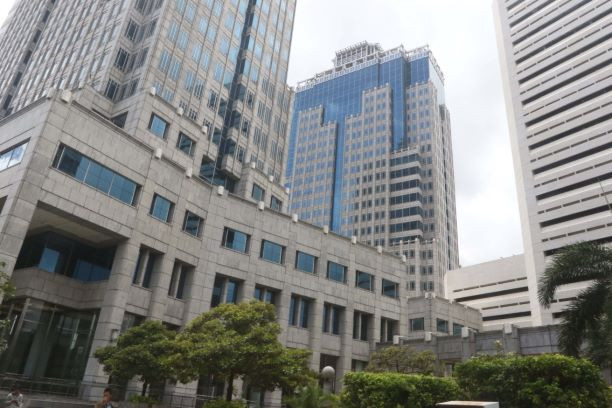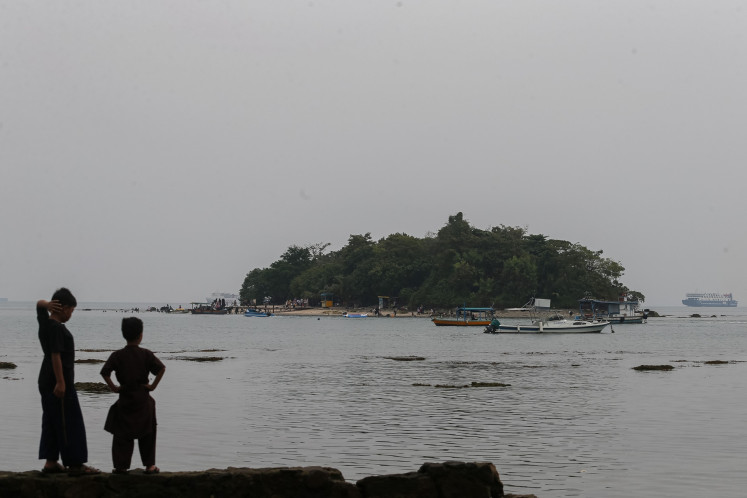Popular Reads
Top Results
Can't find what you're looking for?
View all search resultsPopular Reads
Top Results
Can't find what you're looking for?
View all search resultsBI ends rate hikes after 6 months of hawkishness
The central bank also prepared a time deposit facility to encourage exporters to store foreign exchange receipts in country.
Change text size
Gift Premium Articles
to Anyone

F
or the first time in months, Bank Indonesia (BI) has kept its key interest rate unchanged, marking a break with its policy of monetary tightening.
The benchmark rate will remain at 5.75 percent, the level it reached in January after being raised by a cumulative 225 basis points (bps) over the course of half a year.
The deposit and lending facility rates also stayed unchanged at 5 percent and 6.5 percent, respectively, the central bank announced following its monthly policy meeting on Thursday.
The decision was in line with the expectations of Bank Mandiri and Permata Bank. However, Moody's Analytics had forecast that the central bank would increase the interest rate by 25 bps to 6 percent.
BI Governor Perry Warjiyo explained that the decision was based on core and headline inflation figures, which had both dropped faster than previously projected, as well as on the national economic situation.
He added that core inflation was expected to be in the range around 3 percent, at a maximum of 3.6 percent, in this year’s first half.
Meanwhile, BI sees headline inflation to be 3.5 percent at most at the end of this year, especially given the base effect caused by the government-ordered increase in fuel prices last September.
The central bank projected gross domestic product (GDP) growth this year would fall to between 4.5 and 5.3 percent, "with an upward bias", or around 5.1 percent. It pointed to improvements in China's economic prospects after the elimination of the zero-COVID policy, which would support Indonesia's export performance.
"Aside from that, we also take into account faster [growth of] household spending owing to the retraction of public activity restrictions [PPKM] and improvement in consumer confidence," Perry told reporters on Thursday.
Last week, BI announced that the consumer confidence index had strengthened to 123 points in January, up from 119.9 points in December and the highest reading since August last year.
Bank Mandiri economist Faisal Rachman said he expected the central bank to keep interest rates at 5.75 percent for the rest of the year.
Josua Pardede, chief economist at Permata Bank, concurred, explaining that he was optimistic that BI could maintain the stability of the rupiah and support economic growth.
"The signal [from the central bank] is clear enough. The key word is that the current policy rate is sufficient to manage inflation," Josua told The Jakarta Post on Thursday.
BI pointed to several factors that could underpin the strength of the rupiah, such as a resilient domestic economy, manageable inflation, attractive yields on government bonds and recovery from a period of global economic uncertainty.
Bringing export proceeds home
BI also announced that it would create a foreign currency term deposit facility that could be used by exporters to store their foreign currency receipts (DHE). The central bank promised a "competitive interest" rate for the product, particularly if companies were willing to place larger amounts in Indonesian banks over a longer period of time.
To encourage the uptake of the offer, which is set to come into effect on March 1, BI announced a commission for banks that could persuade exporters to deposit their proceeds.
Coordinating Economic Minister Airlangga Hartarto said on Tuesday that companies should hold at least 30 percent of their export proceeds in Indonesia. He noted that similar regulations had been implemented by other countries, such as Malaysia, Thailand and Turkey.
However, he said, the government still needed time to revise a government regulation on the policy.
Permata Bank's Josua said the term deposit might help strengthen the rupiah. He said one of the reasons that the rupiah had dropped in the fourth quarter of last year, despite strong exports, was the limited amount of third-party foreign currency funds in the country.
"Exporters report their proceeds but place them in offshore institutions," Joshua stated.
The central bank would continue to pursue other strategies to strengthen the domestic currency, such as foreign currency intervention and the selling of short-term bonds and buying up of longer-term ones, known as "operation twist".
Perry noted that the rupiah may remain under pressure for now, as there was “a potential” for the Federal Reserve to lift its benchmark rate to 5.2 percent, given that United States inflation was still quite high.
The central bank noted that the rupiah had strengthened 2.4 percent so far this year, meaning it had outperformed the currencies of other developing countries, such as the Philippines, Thailand and Malaysia.









